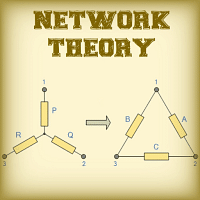Electrical Engineering (EE) Exam > Electrical Engineering (EE) Questions > For making a capacitor, it is better to selec...
Start Learning for Free
For making a capacitor, it is better to select a dielectric having
- a)High permittivity
- b)Low permittivity
- c)Same permittivity as that of air
- d)Very low permittivity
Correct answer is option 'A'. Can you explain this answer?
| FREE This question is part of | Download PDF Attempt this Test |
Verified Answer
For making a capacitor, it is better to select a dielectric havinga)Hi...
In a capacitor the value of capacitor is given by  hence with dielectric having high permittivity higher values of capacitance can be achieved with small capacitor size.
hence with dielectric having high permittivity higher values of capacitance can be achieved with small capacitor size.
 hence with dielectric having high permittivity higher values of capacitance can be achieved with small capacitor size.
hence with dielectric having high permittivity higher values of capacitance can be achieved with small capacitor size.Most Upvoted Answer
For making a capacitor, it is better to select a dielectric havinga)Hi...
Answer:
In the construction of a capacitor, the selection of the dielectric material is crucial as it determines the overall performance of the capacitor. Dielectric materials are used to separate the conductive plates of a capacitor and prevent direct electrical contact between them. The dielectric material affects various characteristics of the capacitor, including capacitance, breakdown voltage, and energy storage capability.
1. High Permittivity:
Choosing a dielectric material with a high permittivity (also known as relative permittivity or dielectric constant) is preferable for making a capacitor. Permittivity is a measure of a material's ability to store electrical energy in an electric field. It indicates the extent to which the electric field is affected by the presence of the dielectric material.
2. Increased Capacitance:
By selecting a dielectric material with high permittivity, the capacitance of the capacitor can be increased. This is because the capacitance of a capacitor is directly proportional to the permittivity of the dielectric material. Higher permittivity allows for more electric flux to be stored, resulting in a higher capacitance value.
3. Smaller Physical Size:
Using a dielectric material with high permittivity enables the construction of capacitors with smaller physical dimensions while maintaining the desired capacitance. This is advantageous in applications where space is limited and compactness is important.
4. Energy Storage:
Dielectric materials with high permittivity can store more energy per unit volume compared to materials with lower permittivity. This is beneficial when designing capacitors for applications that require high energy storage capability.
5. Breakdown Voltage:
One important consideration when selecting a dielectric material is its breakdown voltage. This is the voltage at which the dielectric material fails and allows current to flow through it. Dielectric materials with high permittivity tend to have higher breakdown voltages, providing better insulation and protection against electrical breakdown.
Conclusion:
In summary, choosing a dielectric material with high permittivity is preferred for making capacitors due to its ability to increase capacitance, reduce physical size, enhance energy storage, and provide higher breakdown voltages. These characteristics make capacitors more efficient, reliable, and suitable for various electrical and electronic applications.
In the construction of a capacitor, the selection of the dielectric material is crucial as it determines the overall performance of the capacitor. Dielectric materials are used to separate the conductive plates of a capacitor and prevent direct electrical contact between them. The dielectric material affects various characteristics of the capacitor, including capacitance, breakdown voltage, and energy storage capability.
1. High Permittivity:
Choosing a dielectric material with a high permittivity (also known as relative permittivity or dielectric constant) is preferable for making a capacitor. Permittivity is a measure of a material's ability to store electrical energy in an electric field. It indicates the extent to which the electric field is affected by the presence of the dielectric material.
2. Increased Capacitance:
By selecting a dielectric material with high permittivity, the capacitance of the capacitor can be increased. This is because the capacitance of a capacitor is directly proportional to the permittivity of the dielectric material. Higher permittivity allows for more electric flux to be stored, resulting in a higher capacitance value.
3. Smaller Physical Size:
Using a dielectric material with high permittivity enables the construction of capacitors with smaller physical dimensions while maintaining the desired capacitance. This is advantageous in applications where space is limited and compactness is important.
4. Energy Storage:
Dielectric materials with high permittivity can store more energy per unit volume compared to materials with lower permittivity. This is beneficial when designing capacitors for applications that require high energy storage capability.
5. Breakdown Voltage:
One important consideration when selecting a dielectric material is its breakdown voltage. This is the voltage at which the dielectric material fails and allows current to flow through it. Dielectric materials with high permittivity tend to have higher breakdown voltages, providing better insulation and protection against electrical breakdown.
Conclusion:
In summary, choosing a dielectric material with high permittivity is preferred for making capacitors due to its ability to increase capacitance, reduce physical size, enhance energy storage, and provide higher breakdown voltages. These characteristics make capacitors more efficient, reliable, and suitable for various electrical and electronic applications.
Free Test
FREE
| Start Free Test |
Community Answer
For making a capacitor, it is better to select a dielectric havinga)Hi...
In a capacitor the value of capacitor is given by  hence with dielectric having high permittivity higher values of capacitance can be achieved with small capacitor size.
hence with dielectric having high permittivity higher values of capacitance can be achieved with small capacitor size.
 hence with dielectric having high permittivity higher values of capacitance can be achieved with small capacitor size.
hence with dielectric having high permittivity higher values of capacitance can be achieved with small capacitor size.Attention Electrical Engineering (EE) Students!
To make sure you are not studying endlessly, EduRev has designed Electrical Engineering (EE) study material, with Structured Courses, Videos, & Test Series. Plus get personalized analysis, doubt solving and improvement plans to achieve a great score in Electrical Engineering (EE).

|
Explore Courses for Electrical Engineering (EE) exam
|

|
Similar Electrical Engineering (EE) Doubts
For making a capacitor, it is better to select a dielectric havinga)High permittivityb)Low permittivityc)Same permittivity as that of aird)Very low permittivityCorrect answer is option 'A'. Can you explain this answer?
Question Description
For making a capacitor, it is better to select a dielectric havinga)High permittivityb)Low permittivityc)Same permittivity as that of aird)Very low permittivityCorrect answer is option 'A'. Can you explain this answer? for Electrical Engineering (EE) 2024 is part of Electrical Engineering (EE) preparation. The Question and answers have been prepared according to the Electrical Engineering (EE) exam syllabus. Information about For making a capacitor, it is better to select a dielectric havinga)High permittivityb)Low permittivityc)Same permittivity as that of aird)Very low permittivityCorrect answer is option 'A'. Can you explain this answer? covers all topics & solutions for Electrical Engineering (EE) 2024 Exam. Find important definitions, questions, meanings, examples, exercises and tests below for For making a capacitor, it is better to select a dielectric havinga)High permittivityb)Low permittivityc)Same permittivity as that of aird)Very low permittivityCorrect answer is option 'A'. Can you explain this answer?.
For making a capacitor, it is better to select a dielectric havinga)High permittivityb)Low permittivityc)Same permittivity as that of aird)Very low permittivityCorrect answer is option 'A'. Can you explain this answer? for Electrical Engineering (EE) 2024 is part of Electrical Engineering (EE) preparation. The Question and answers have been prepared according to the Electrical Engineering (EE) exam syllabus. Information about For making a capacitor, it is better to select a dielectric havinga)High permittivityb)Low permittivityc)Same permittivity as that of aird)Very low permittivityCorrect answer is option 'A'. Can you explain this answer? covers all topics & solutions for Electrical Engineering (EE) 2024 Exam. Find important definitions, questions, meanings, examples, exercises and tests below for For making a capacitor, it is better to select a dielectric havinga)High permittivityb)Low permittivityc)Same permittivity as that of aird)Very low permittivityCorrect answer is option 'A'. Can you explain this answer?.
Solutions for For making a capacitor, it is better to select a dielectric havinga)High permittivityb)Low permittivityc)Same permittivity as that of aird)Very low permittivityCorrect answer is option 'A'. Can you explain this answer? in English & in Hindi are available as part of our courses for Electrical Engineering (EE).
Download more important topics, notes, lectures and mock test series for Electrical Engineering (EE) Exam by signing up for free.
Here you can find the meaning of For making a capacitor, it is better to select a dielectric havinga)High permittivityb)Low permittivityc)Same permittivity as that of aird)Very low permittivityCorrect answer is option 'A'. Can you explain this answer? defined & explained in the simplest way possible. Besides giving the explanation of
For making a capacitor, it is better to select a dielectric havinga)High permittivityb)Low permittivityc)Same permittivity as that of aird)Very low permittivityCorrect answer is option 'A'. Can you explain this answer?, a detailed solution for For making a capacitor, it is better to select a dielectric havinga)High permittivityb)Low permittivityc)Same permittivity as that of aird)Very low permittivityCorrect answer is option 'A'. Can you explain this answer? has been provided alongside types of For making a capacitor, it is better to select a dielectric havinga)High permittivityb)Low permittivityc)Same permittivity as that of aird)Very low permittivityCorrect answer is option 'A'. Can you explain this answer? theory, EduRev gives you an
ample number of questions to practice For making a capacitor, it is better to select a dielectric havinga)High permittivityb)Low permittivityc)Same permittivity as that of aird)Very low permittivityCorrect answer is option 'A'. Can you explain this answer? tests, examples and also practice Electrical Engineering (EE) tests.

|
Explore Courses for Electrical Engineering (EE) exam
|

|
Suggested Free Tests
Signup for Free!
Signup to see your scores go up within 7 days! Learn & Practice with 1000+ FREE Notes, Videos & Tests.
























